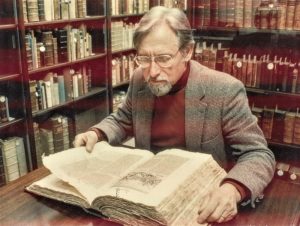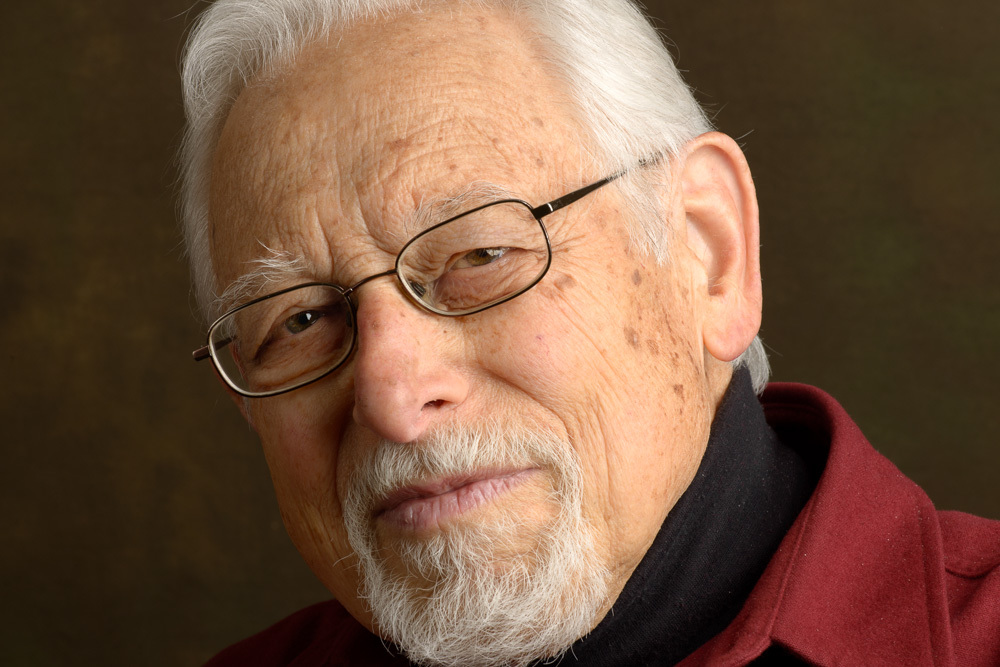Ray Gingerich, a professor of theology and ethics who inspired generations of students to think in new ways about their callings and helped to shape Eastern Mennonite University’s strong ethos of peace and justice, died Sunday, June 17, 2018, of cancer. He was 84.
From the creation of the first course in peace and justice during his first year on campus in 1977 to his retirement in 2004 and the years after, friends and colleagues remember Gingerich as passionately dedicated to Christian discipleship.
“How does one present Jesus as our example for life today – this Jesus who was killed for the kind of life he lived? How does one speak of Jesus’ call to take up our cross as good news to a people already vulnerable and suffering?” he wrote in a 1999 Mennonite World Review article, soon after leading a peace and justice short course in war-ravaged Colombia.
A co-founder of the Center for Justice and Peacebuilding

An alumnus who returned to teach after service overseas and doctoral studies at Vanderbilt University, Gingerich made a deep and transformative impact over 27 years on EMU’s undergraduate and graduate programs: He established a minor in peace and justice studies in 1979, the precursor to today’s three peacebuilding-related majors, and was for many years the faculty sponsor to EMU’s Peace Fellowship, an organization still active on campus today.
In the late ‘80s, he and colleague Vernon Jantzi helped to recruit John Paul Lederach to a teaching position in the sociology department. The addition of Ron Kraybill to the faculty eventually led to the quartet’s collaborative founding of the Conflict Transformation Program, now the globally-renowned Center for Justice and Peacebuilding. Their joint commitment to ensuring that global voices would help to shape the program’s mission and curriculum led to the inclusion, in planning stages and for three years following, of Dr. Hizkias Assefa, then from the Nairobi Peace Initiative in Kenya, and Ricardo Esquivia J.D. and Dr. Paul Stucky, then both from JustaPaz in Colombia.
Connected with restorative justice pioneer
Gingerich also made the first connection with Howard Zehr, then a founding practitioner in the new field of restorative justice with Mennonite Central Committee.
“He kept pestering me to promise that I wouldn’t take another job without checking with him,” Zehr recalled. With eventual further guidance by Jantzi, Zehr would eventually find his way to EMU.
Zehr’s arrival, thanks to Gingerich’s persistence, opened the university to new alternative visions of justice. Long at the forefront of the restorative justice movement, the university now offers two master’s degrees as well as professional trainings, and houses the Zehr Institute for Restorative Justice.
Those who remember Gingerich as persistent also call him passionate. “When I think of Ray as a professor at Eastern Mennonite,” says former dean Lee Snyder, “perhaps the word that best describes him is passionate. Deeply committed to his faith and to living out the way of peace and justice, Ray enlivened the classroom with energy and intellectual challenge. His appreciation for his Anabaptist heritage and for the ways we are called to make a difference in the world have indelibly shaped his students. He will not be forgotten.”
A vision of the Gospel beyond simply service and individual salvation
Tony Krabill, a 1989 graduate who took two courses from Gingerich, remembers him well.
“Many of my EMU contemporaries and I have been reflecting on the influence Ray Gingerich had in shaping the theology, world view, and passion for peace and justice of a whole generation of students who are now leaders and laborers in the church and beyond,” Krabill said. “Gingerich, along with Titus Bender and Vernon Jantzi, were part of a trio who really galvanized a sense of call in their students that the gospel was more than just individual salvation and evangelism, or even service in the traditional 20th century Mennonite context, but about speaking truth to power and advocacy on behalf of the poor oppressed.”
Krabill, who now works at WVPE public radio station in Elkhart, Indiana, says the opportunity to witness how faith-filled conviction, with the help of media amplification, can speak “truth to power” changed the course of his life.
While a student, Krabill observed Gingerich, Bender and Jantzi, with WEMC station manager Ed Nyce, develop a 15-minute weekly radio program, “Global Village Forum.” Highlighting peace and justice issues, the program was “an alternative to some of the syndicated Christian programs the station aired at the time that didn’t always seem to line up with Anabaptist theology or the mission of EMU,” said Krabill. “Those conversations inspired me to work in radio and shine a light on topics that receive little coverage.”
After concluding his teaching career, Gingerich helped found the Anabaptist Center of Religion and Society, a community of retired academic colleagues from Mennonite and other neighboring higher education institutions. The organization hosts monthly meetings and has an active agenda, which has resulted in a book series and many other contributions. He has also provided critical support for the Center for Interfaith Engagement.
Tributes are welcome in the comment box below. They will be shared with the family.
Visitation will be Thursday, June 28, 6-8 p.m. at Community Mennonite Church, 70 S. High St., Harrisonburg, Virginia. A memorial service will be held at Community Mennonite Church in Harrisonburg on Friday, June 29, at 11 a.m., with a fellowship meal and sharing following.
A faith-inspired life
The following text was contributed by his family.
Ray Gingerich died on June 17, 2018, after a long struggle with metastatic prostate cancer. Ray was born to Amish parents, Chris and Susie Anna (Miller) Gingerich, near Kalona, Iowa, on August 26, 1933. Ray was reared in a frugal, hard-working, and conscientious extended family; his Conservative Mennonite maternal grandparents lived in an attached Daadi Haus.
By the time Ray was sixteen, his parents had joined the recently established Beachy Amish Church, where he was baptized. When he was nineteen, Ray served as leader of the national Beachy Amish youth organization.
Ray attended school through the eighth grade and then spent his adolescence working on the prosperous family farm. He relished all aspects of farming, but was exposed to a larger world when he was drafted into 1-W (alternative military) service during the Korean War. He was assigned to work at Lancaster General Hospital, and subsequently volunteered for a summer teaching Bible school in the Bronx and Brooklyn, which awakened a curiosity that led him to pursue college education.
On August 26, 1956, he married Wilma Beachy, also of Kalona. One week after they married, Ray and Wilma left for Eastern Mennonite College (now University) in Harrisonburg, Virginia. After Ray completed college and an additional year at Eastern Mennonite Seminary, they headed to Luxembourg as missionaries under Eastern Mennonite Board of Missions, now with two-year-old twin sons in tow. Ray and Wilma would be blessed with two more sons during their seven years in Luxembourg (1961–68), where Ray pastored a small Mennonite congregation and started a Christian bookstore. Significant questions about mission and the way of Jesus emerged through his experiences and ecumenical encounters in post-war (and increasingly post-Christendom) Europe.
After returning from Europe, Ray continued his studies at Associated (now Anabaptist) Mennonite Biblical Seminary in Elkhart, Indiana. Harboring deep doubts about a traditional doctrinally framed Christian faith, his engagement there with Anabaptist peace theology and his interactions with missionaries returning from interreligious and cross-cultural settings led to what he called a “second conversion.”
Ray continued doctoral studies in historical theology at Vanderbilt University, in Nashville, Tennessee. His dissertation explored the mission impulse of the sixteenth-century Anabaptist movement.
In 1977 Ray began teaching at EMU in the Department of Bible and Religion. He helped develop a peace and justice minor at the college and for years team-taught with valued colleagues Vernon Jantzi and Titus Bender. These courses had a deep impact on many students, who went on to serve the church and their communities. Ray also regularly taught courses at EMS. For many years, Ray was faculty sponsor for an active peace fellowship on campus. He helped recruit faculty and envision programs that developed into the Center for Justice and Peacebuilding. He has also provided critical support for the Center for Interfaith Engagement. After concluding his teaching career in 2004, Ray helped found the Anabaptist Center of Religion and Society, which among other things has gathered and shared the personal and faith stories of numerous teachers and elders in the church.
For more than 25 years, Ray and Wilma have been active participants in small group and congregational life at Community Mennonite Church in Harrisonburg, Virginia.
Preceding Ray in death are his parents Chris and Susie Anna (Miller) Gingerich, and his older sister, Mary (Lewis) Swantz. Surviving him are his wife of 61 years, Wilma Jean Gingerich (daughter of Andy and Lizzie Beachy); sisters Clara (Harley) Miller and Esther (Jacob) Yoder; four sons and eight grandchildren: James (Barbara) Nelson Gingerich with children Jonathan Nelson Gingerich (Jyoti Bock) and Daniel Nelson Gingerich (Meagan Parisi); John Gingerich (Eva Mengelkoch); André Gingerich (Cathy) Stoner with children Tobias (Cecilia) Pessoa Gingerich, Miriam, Matthew, and Martin Stoner; and Pierre (Lori) Gingerich-Boberg with children Simone and Josette Gingerich-Boberg.
Ray’s body was donated to the Virginia State Anatomical Program for scientific research.

Deep gratitude for Ray’s life and the profound influence he had on the course of EMU and it’s vision and impact in the world.
I am a 1983 graduate of EMU and am so proud to tell people about the peace and justice program and the influence it has had both in the college community and in far-reaching ways in the world. I am particularly grateful for the way in which people like Ray have evolved the idea of “mission” and broadened the circle of service to serve humanity in its inclusion rather than exclusion.
Deep bow to Ray and his new transition!
To Sir, with Love.
Ray, we loved you and we always will! And I am confident that somehow God allows you even now to be aware of how many of us feel that way. What an inspiration and joy you and Wilma and your whole family have been to us. I and the others here at Jubilee Partners are so very grateful to be among your friends. With all of its problems, the world is a much better place than it would have been without your faithful witness and the work you have inspired so many of us to continue.
I did not know Ray, but am deeply grateful for his leadership in fostering restorative justice and creating structures to support it and help it flourish. My heart is with his family and all who knew and loved him.
I initially first knew Ray and Wilma as friends of my parents and as a college student I was struck by Ray’s vision for combining Anabaptist theology with practical issues of the day. Since string instruments were part of the family’s artistic life I was able to visit with them for chamber music sessions in their living room, in my parent’s house and in contributions to Park View Mennonite church’s worship services. Then our lives went on and I lost track of James, John, André, and Pierre. I did, however, see Ray and Wilma on occasion at Bach Festival concerts, where I continue to play. The last time I saw Ray was during the intermission of a concert one year ago. We spent a good part of that break in the music to catch up and Ray shared openly about his condition, how he was feeling and how he was thinking about his future and the short time he had left. Ray had a big heart and a generous spirit and conventional expectations never held him back. A very special person.